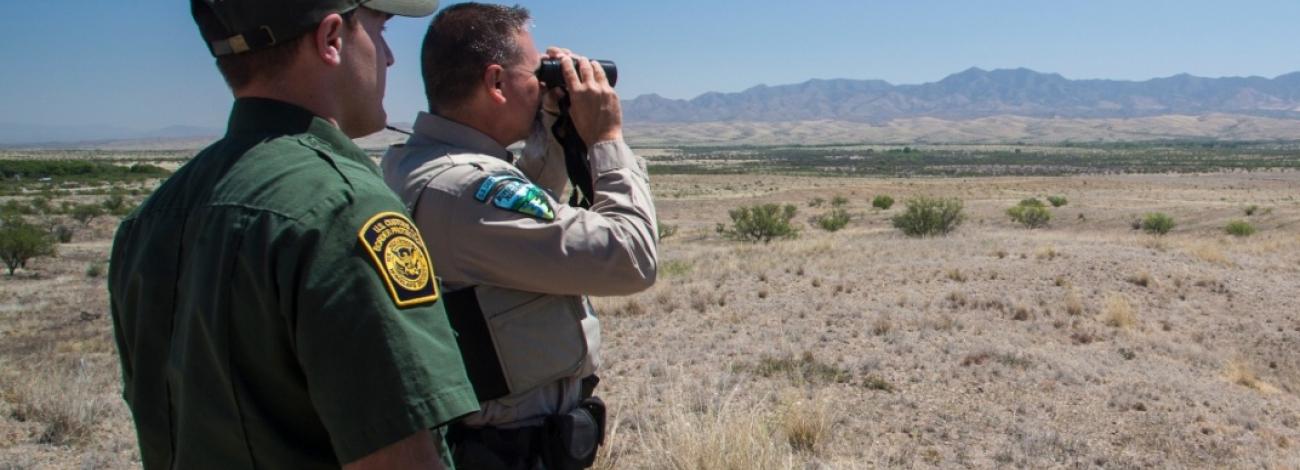
BLM'S Law Enforcement Authority
The Bureau of Land Management's law enforcement program draws its authority from federal law under federal jurisdiction. BLM law enforcement officers enforce federal laws and do not have authority to enforce state laws without written authorization from a sheriff, other authorized state official or state law. Many laws and regulations that BLM law enforcement officers enforce are similar to state and local laws, and many federal regulations prohibit the same acts as state laws. For example, crimes such as littering, illegal take of migratory waterfowl and exceeding the posted speed limit in a motor vehicle are all prohibited by both federal and state laws.
The Federal Land Policy and Management Act specifically gives BLM law enforcement officers traditional police powers such as enforcing federal laws, carrying firearms, serving search warrants, making arrests with or without a warrant and conducting searches of places or people with or without a warrant in accordance with applicable laws and seizing evidence.
- Laws Enforced by BLM
- Antiquities Act 16 USC 433
- Land and Water Conservation Fund Act 16 USC 4601-6a
- Archeological Resources Protection Act 16 USC 470aa
- Bald Eagles Act 16 USC 668a
- Sikes Act 16 USC 6 70j
- Migratory Bird Act 16 USC 703
- National Trails System Act 16 USC 1241-46
- Wild Free-Roaming Horse and Burro Act 16 USC 1331-40
- Endangered Species Act 16 USC 1538
- Lacey Act 16 USC 3372
- Federal Cave Resources Act 16 USC 4306
- Aerial hunting of wild horses or burros 18 USC 47
- Assault on a BLM employee or volunteer 18 USC 111
- Theft of government property 18 USC 641
- False statements or entries 18 USC 1001
- Native American Graves and Repatriation Act 18 USC 1170
- Destruction of government property 18 USC 1361
- Timber removed or transported 18 USC 1852
- Trees cut or injured 18 USC 1853
- Timber, grass or brush set afire 18 USC 1855
- Fires left unattended and unextinguished 18 USC 1856
- Fences destroyed; livestock entering 18 USC 1857
- Survey marks destroyed or removed 18 USC 1858
- Surveys interrupted 18 USC 1859
- Bids at land sales 18 USC 1860
- Deception of prospective purchasers 18 USC 1861
- Hazardous or injurious devices on federal lands 18 USC 1864
- Controlled Substances 21 USC 841
- Mineral Leasing Act 30 USC 195
- Federal Oil and Gas Royalty Management Act 30 USC 1701
- Clean Water Act 33 USC 1319
- Resource Conservation and Recovery Act 42 USC 6928d
- Taylor Grazing Act 43 USC 315a
- Unlawful Inclosures of Public Lands Act 43 USC 1061-64
- Federal Land Policy and Management Act 43 USC 1733
- Regulations Enforced by BLM
- Protection of archeological resources 43 CFR Part 7
- Hunting, fishing, trapping (state federal laws)
- Rights-of-way 43 CFR Subpart 2800
- Tram roads and logging roads 43 CFR Part 2810
- Rights-of-way under the Mineral Leasing Act 43 CFR Part 2800
- Leases, permits, and easements 43 CFR Part 2920
- Special recreation permits 43 CFR Subpart 2930
- Use and occupancy under the mining laws 43 CFR Subpart 3715
- Surface management 43 CFR Subpart 3809
- Prohibited acts, grazing 43 CFR Subpart 4140
- Prohibited acts, wild free-roaming horses and burros 43 CFR Subpart 4770
- Contracts and permits, timber and other vegetative resources 43 CFR Subpart 5462
- Free use of timber 43 CFR 5511
- Designated wilderness areas 43 CFR Subpart 6302
- Research natural areas 43 CFR Subpart 8223
- Fossil forest research natural area 43 CFR Subpart 8224
- Off-road vehicles 43 CFR Part 8340
- Designated national areas 43 CFR Subpart 8351
- Closures and restrictions 43 CFR Subpart 8364
- Rules of conduct 43 CFR Subpart 8365
- Wildfire prevention 43 CFR Subpart 9212
- Migratory birds hunting 50 CFR Part 20
- Subsistence management for public lands in Alaska 50 CFR Part 100
